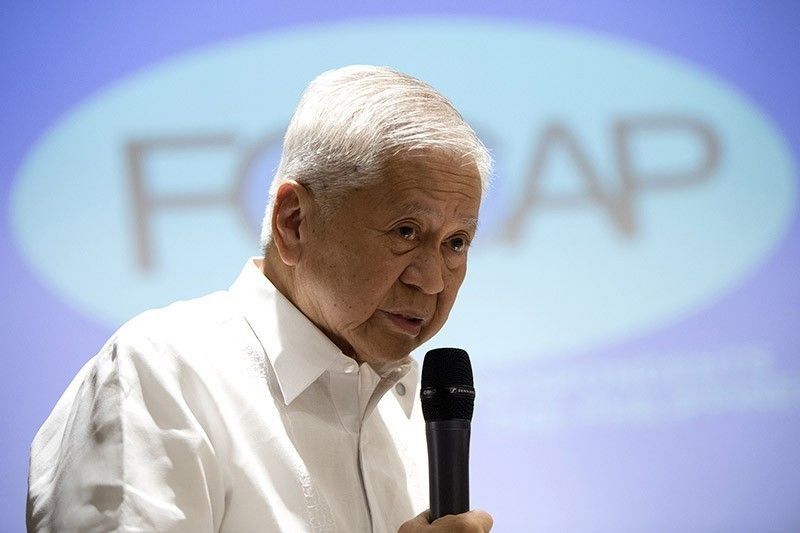Is Hong Kong still a safe place for capital? Expert weighs in after exclusion of Del Rosario

MANILA, Philippines — Former Philippine Foreign Affairs Secretary Albert del Rosario was about to attend a business meeting when he was denied entry to Hong Kong Friday.
Many described Hong Kong’s move as retaliation for Del Rosario’s remarks against Beijing's maritime encroachment in the West Philippines Sea — a development that an analyst said might prompt businesses to reconsider investing in the Chinese-controlled territory.
Del Rosario said he flew to Hong Kong using a diplomatic passport when he was taken to an immigration holding area on arrival and remained there "for nearly three and a half hours".
He was supposed to attend First Pacific’s shareholders meeting. The Philippines’ former top diplomat sits as a non-executive director of the Hong Kong-listed investment management company.
The exclusion of Del Rosario, who played a key role in legal initiatives against China, could raise questions on whether Hong Kong is still a safe place for capital, said Aaron Connelly, a research fellow at the International Institute for Strategic Studies (IISS) in Singapore.
“If you are one of those Southeast Asian officials watching what is happening to Del Rosario today, it’s likely to have a chilling effect on the extent to which you are willing to criticize Beijing,” Connelly was quoted as saying in a report by Los Angeles Times.
“[And] if you are a business figure looking to get into politics, you might also think about moving your money somewhere else so as to have a free hand to deal with China, which could erode Hong Kong’s reputation as a safe place for capital,” he added.
In 2016, a United Nations-backed tribunal — acting on a 2013 case filed by former Philippine officials, including Del Rosario — invalidated Beijing's claim to most of South China Sea.
Del Rosario, along with former Ombudsman Conchita Carpio-Morales, submitted early this year a communication before the International Criminal Court against Chinese President Xi Jinping, alleging "crimes against humanity" over Beijing’s activities in the disputed waterway.
Last month, Carpio-Morales was briefly held by Hong Kong immigration when she made a private visit to the territory with her family.
‘Pattern of harassment’
Hong Kong has long been under pressure from its regional rival Singapore for the title of Asia's business capital. With its sky-high rents and tiny living spaces, the Asian finance hub is known as a home to regional headquarters of multinational companies.
Although Hong Kong was returned from British to Chinese rule in 1997, it is still administered separately under an arrangement known as "One country, two systems".
Hong Kong’s move to bar Del Rosario from entering the semi-autonomous territory comes amid massive protests in the city over a proposed bill that critics say would have allowed extraditions to the mainland for political or commercial reasons.
Top executives in Hong Kong have warned they will have "no reason to stay" if the city's freedoms are damaged by the extradition bill.
China has yet to offer an explanation on Friday’s incident, but Beijing's foreign affairs ministry spokesman Lu Kang told reporters: "Who is allowed or not allowed to enter the country is entirely China's sovereignty".
Also on Friday, Hong Kong opposition lawmaker Ted Hui Chi-fung said "it appears that Hong Kong is no longer a free and open international city," adding that cases like Del Rosario and Morales “could be easily elevated and they could be accused of having committed an offense in China and be arrested while in Hong Kong” if the extradition bill passes.
Considering the similarly cold reception received by Carpio-Morales last month, IISS’s Connelly told Philstar.com that “this appears to be a pattern of harassment by Hong Kong authorities.”
“The goal of that campaign seems to be to silence critical voices in the Philippines,” Connelly said in an interview.
“It seems that the Chinese Communist Party wants a similar deal with Filipinos as it has with its own people: You can become prosperous, but only if you keep quiet,” he added.
“The question for Filipinos is whether you want to take this deal — given that, unlike PRC citizens, you have alternative economic partners, in Japan, the U.S., and Europe, that do not make such demands.” — With reports from AFP
- Latest
- Trending


























